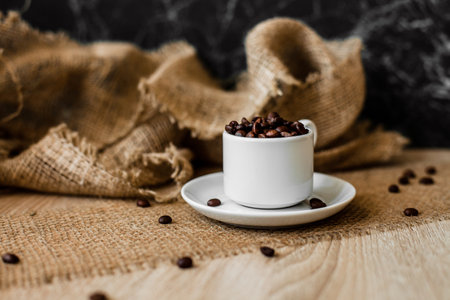The Rise of Fair Trade Coffee in America
Step into any hip café from the foggy streets of San Francisco to the bustling corners of Brooklyn, and you’ll likely spot “Fair Trade” proudly displayed on chalkboard menus and coffee bags. But how did Fair Trade coffee make its way into the American consciousness, transforming not just what’s in our cups but how we think about coffee altogether? The journey began in earnest during the early 2000s, when socially conscious consumers—especially millennials—started looking beyond flavor profiles and caffeine buzzes, seeking products that aligned with their values. This shift sparked a demand for transparency in sourcing, pushing roasters and coffee shops to consider their impact on farmers and communities overseas. As a result, Fair Trade certifications became a badge of honor for cafés aiming to attract ethically minded regulars. From Portland’s indie coffeehouses to sleek Manhattan espresso bars, these certifications now signal both quality and responsibility, reshaping American café culture one pour-over at a time.
2. What Fair Trade Means in Everyday Terms
If you’ve ever spotted a Fair Trade label on your bag of beans at the local grocery store or your neighborhood café, you might have wondered what it really stands for—beyond the feel-good buzzwords. At its heart, Fair Trade is about connecting your morning ritual with global impact. Let’s break down exactly what that means for you, the farmers, and everyone along the supply chain.
Better Prices for Farmers
Fair Trade certification guarantees a minimum price for coffee farmers—one that covers the costs of sustainable production and shields them from volatile market swings. In real-world terms, this means more stable income and investment in their communities, rather than being at the mercy of fluctuating commodity prices.
| Conventional Coffee | Fair Trade Coffee | |
|---|---|---|
| Price Stability | Subject to market volatility | Guaranteed minimum price |
| Farmer Income Security | Unpredictable, can fall below cost | More predictable and sustainable |
| Community Investment | Limited resources for improvement | Premiums fund social projects (schools, clinics) |
Transparency for Buyers
Coffee lovers in the U.S. are increasingly curious about where their cup comes from. Fair Trade provides clear traceability—so you can follow your coffee’s journey from farm to filter. For cafés and roasters, this transparency translates into stronger relationships with producers and an ability to share those stories with customers who care about ethics as much as flavor.
Everyday Impact: What These Values Look Like in Your Cup
Your daily cup of joe becomes more than just a caffeine fix—it’s an act of solidarity. With each Fair Trade purchase, you’re supporting smallholder farmers striving for a better life and encouraging industry-wide shifts toward ethical sourcing. The next time you order a pour-over or grab a latte to go, you’re not just choosing taste; you’re backing values that echo far beyond your city block.
![]()
3. Navigating Specialty Coffee Culture
Step into the heart of America’s specialty coffee revolution, and you’ll find yourself surrounded by a vibrant culture that’s rewriting the rules of how we experience our daily brew. From Portland’s hipster cafés to Brooklyn’s minimalist espresso bars, third-wave coffee shops are popping up in every corner of the country, making ethically sourced, expertly brewed coffee part of everyday urban life. Here, fair trade isn’t just a label—it’s a badge of honor for both baristas and customers who care about where their cup comes from.
The Rise of Third-Wave Cafés
Gone are the days when coffee was just a morning pick-me-up. Today’s third-wave cafés focus on transparency, traceability, and taste—celebrating beans from single origins and highlighting the farmers behind each harvest. American consumers are increasingly seeking out these experiences, eager to learn about the journey from seed to cup. These cafés often showcase their fair trade partnerships front and center, turning every latte into an opportunity for education and advocacy.
Barista Competitions: Where Craft Meets Community
Barista competitions have become cultural mainstays in cities like Seattle, Los Angeles, and Austin. These events aren’t just about brewing the perfect espresso—they’re platforms for sharing new ideas about sustainability, sourcing, and innovation. The best baristas champion fair trade coffees, using their stage presence to highlight ethical practices while dazzling audiences with pour-over artistry and signature drinks. It’s a sign that specialty coffee culture in America is as much about community values as it is about flavor notes.
Single-Origin Beans: Telling Stories in Every Sip
The obsession with single-origin beans—coffees grown in one specific region or even a single farm—has transformed how Americans think about their morning cup. Each bag tells a story: about terroir, tradition, and the hands that cultivated it. Fair trade certifications assure drinkers that these stories include fair wages and sustainable practices. As this movement grows, more consumers are choosing quality over quantity, voting with their wallets for a future where specialty coffee means both better taste and better ethics.
4. Challenges in Blending Fair Trade With Specialty Coffee
While both Fair Trade and the specialty coffee movement strive to improve the lives of coffee producers and elevate the coffee experience for consumers, the intersection of these two missions is not always seamless. Let’s explore some common myths and realities when it comes to merging ethical sourcing with a relentless pursuit of quality.
Myths vs. Realities: Alignments and Clashes
| Common Myth | Reality Check |
|---|---|
| All Fair Trade coffee is high quality | Fair Trade certification focuses on ethical and economic standards, not necessarily on cup quality or flavor complexity. |
| Specialty coffee always guarantees fair compensation for farmers | Specialty buyers may pay premium prices for top-tier beans, but this isn’t universally true for all transactions or producers within the supply chain. |
| The missions of Fair Trade and specialty coffee are naturally aligned | The goals sometimes diverge—Fair Trade prioritizes social justice while specialty coffee can prioritize flavor profiles and exclusivity. |
Where Missions Align
Both movements share a deep respect for transparency, traceability, and building direct relationships between roasters and producers. When successful, collaborations result in higher-quality coffees that also deliver social value to farming communities. These partnerships can empower smallholder farmers by providing access to specialty markets and technical training, all while ensuring minimum price protections.
Where Tensions Arise
The tension emerges when the standards for quality and ethics do not overlap perfectly. For example, a farm may meet rigorous Fair Trade criteria but struggle to produce beans that meet the strict flavor requirements of specialty buyers. Conversely, some outstanding micro-lot coffees may come from producers who can’t afford certification fees or whose farms don’t fit Fair Trade cooperative models. The specialty market’s focus on unique cup profiles can sometimes exclude coffees that would otherwise provide stable incomes through Fair Trade contracts.
Toward Harmonization: Is It Possible?
Navigating these challenges requires creativity and compromise from all players—importers, roasters, baristas, and even consumers. Some forward-thinking roasters are experimenting with hybrid models that combine direct trade principles with third-party certifications. Transparency remains key; sharing stories about how coffee is sourced, graded, and paid for helps build trust with customers who care about both ethics and taste.
5. Looking Ahead: Trends and Innovations
The specialty coffee scene in America is a living, breathing experiment—one that never stops evolving. As we look to the future of Fair Trade within this industry, it’s clear that innovation is brewing on multiple fronts.
Tech Transforms Transparency
From blockchain traceability to mobile apps that connect consumers with farmers’ stories, technology is reshaping how we understand our daily brew. These tools empower drinkers to trace each bean back to its source, holding both roasters and certifiers accountable and making Fair Trade claims more than just a sticker on a bag.
The Rise of Direct Trade
Direct trade models are gaining traction alongside traditional Fair Trade certification. Many indie roasters in cities like Portland and Brooklyn are forming personal relationships with growers, ensuring quality and fair compensation without always relying on third-party certifications. This approach adds nuance to the Fair Trade conversation, giving producers more agency while demanding transparency from importers and cafés alike.
Consumer Activism: Sipping With Purpose
American coffee lovers are increasingly voting with their wallets—seeking out brands that match their values. Through social media campaigns and grassroots movements, today’s drinkers push companies toward ethical sourcing, diversity, and sustainable practices. This activism keeps the pressure on big players to not just meet minimum standards but to truly invest in positive change for coffee-growing communities.
Youth Culture: The Next Wave of Coffee Pros
The next generation of baristas, roasters, and café owners is rewriting the rules. Fueled by global connections and a passion for justice, these young professionals see Fair Trade as a baseline—not a finish line. They’re experimenting with profit-sharing models, transparent pricing breakdowns, and new ways to support marginalized producers. Their creativity hints at a future where “fair” means ever more inclusive—and delicious—coffee experiences.
Pushing Boundaries Together
In this era of collaboration and innovation, Fair Trade’s evolution will depend on everyone in the supply chain—from farmers in Guatemala to customers in San Francisco. As trends shift and innovations bloom, the American specialty coffee community is uniquely positioned to lead the charge toward an industry where fairness isn’t just a label—it’s a way of life.


